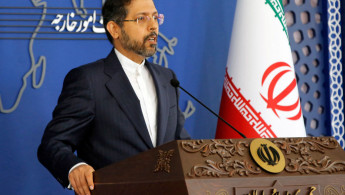Iran: Deal with US on prisoners, nuclear pact possible 'if Washington has determination'
Tehran on Monday said it is "possible" to reach an agreement on the two issues of Iran-US prisoners' release and the Vienna talks to restore the 2015 nuclear deal.
"They are two different paths, but if the other party [the US] has the determination, there is the possibility that we reach a reliable and lasting agreement in both of them in the shortest time," foreign ministry spokesman Saeed Khatibzadeh said during his weekly press conference.
Khatibzadeh's comments came in reaction to remarks made by the US envoy for Iran, Robert Malley, who on Sunday said it is unlikely that Washington would strike an agreement unless Tehran releases four US citizens.
"Iran has not accepted any precondition from day one of the negotiations," Khatibzadeh said. He added that "the negotiations are complicated enough, and should not get more complex with complicated remarks".
The four US citizens held in Iran are Iranian-American businessman Siamak Namazi, 50, and his father Baquer, 85, as well as environmentalist Morad Tahbaz, 66, and businessman Emad Sharqi, 57.
"It is a humanitarian issue and it was on our agenda, both before these negotiations and during them," Khatibzadeh said, referring to the situation of Iranian nationals kept in US.
Regarding the latest situation of nuclear talks in Vienna, Khatibzadeh said "we are seeing progress in the negotiations in the right direction in Vienna," but "very important issues still remain" which require political decisions by Washington.
The drive to salvage the 2015 nuclear deal resumed in late November, after talks were suspended in June as Iran elected ultraconservative President Ebrahim Raisi.
The 2015 deal - agreed by Iran, the US, China, Russia, Britain, France and Germany - offered Tehran sanctions relief in exchange for curbs on its nuclear programme.
But the US unilaterally withdrew in 2018 under then-president Donald Trump and reimposed biting economic sanctions, prompting Tehran to begin rolling back on its commitments.





 Follow the Middle East's top stories in English at The New Arab on Google News
Follow the Middle East's top stories in English at The New Arab on Google News
![The UAE is widely suspected of arming the RSF militia [Getty]](/sites/default/files/styles/image_330x185/public/2024-11/GettyImages-472529908.jpg?h=69f2b9d0&itok=Yauw3YTG)
![Netanyahu furiously denounced the ICC [Getty]](/sites/default/files/styles/image_330x185/public/2024-11/GettyImages-2169352575.jpg?h=199d8c1f&itok=-vRiruf5)
![Both Hamas and the Palestinian Authority welcomed the ICC arrest warrants [Getty]](/sites/default/files/styles/image_330x185/public/2024-11/GettyImages-2178351173.jpg?h=199d8c1f&itok=TV858iVg)